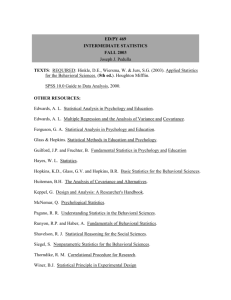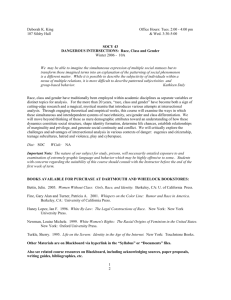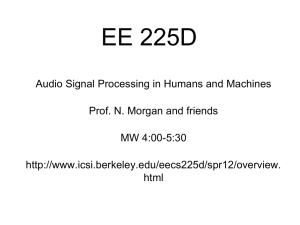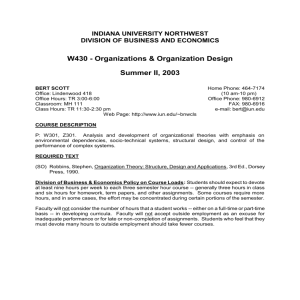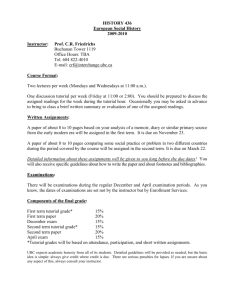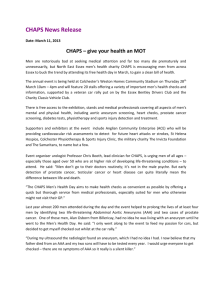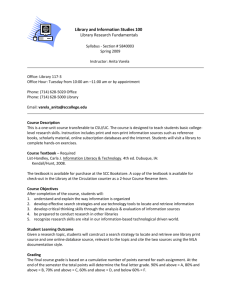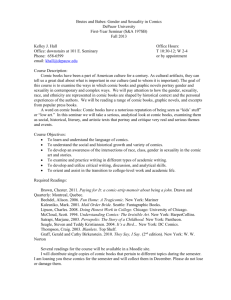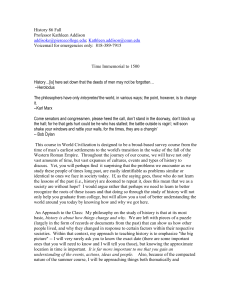Politics of the European Union
advertisement
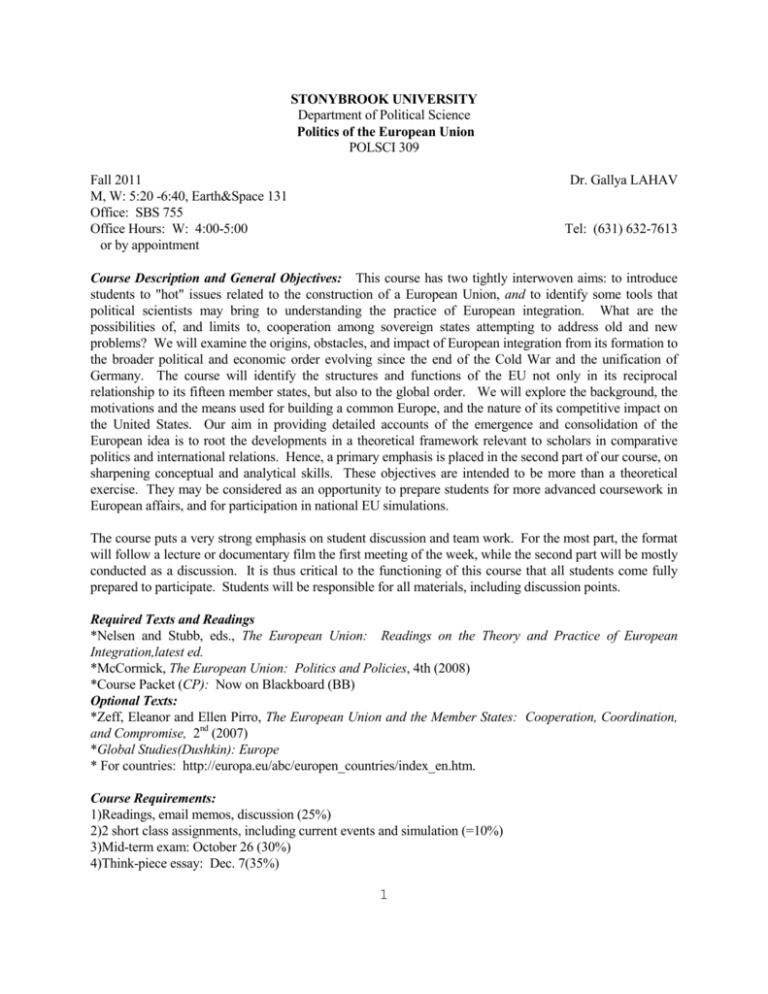
STONYBROOK UNIVERSITY Department of Political Science Politics of the European Union POLSCI 309 Fall 2011 M, W: 5:20 -6:40, Earth&Space 131 Office: SBS 755 Office Hours: W: 4:00-5:00 or by appointment Dr. Gallya LAHAV Tel: (631) 632-7613 Course Description and General Objectives: This course has two tightly interwoven aims: to introduce students to "hot" issues related to the construction of a European Union, and to identify some tools that political scientists may bring to understanding the practice of European integration. What are the possibilities of, and limits to, cooperation among sovereign states attempting to address old and new problems? We will examine the origins, obstacles, and impact of European integration from its formation to the broader political and economic order evolving since the end of the Cold War and the unification of Germany. The course will identify the structures and functions of the EU not only in its reciprocal relationship to its fifteen member states, but also to the global order. We will explore the background, the motivations and the means used for building a common Europe, and the nature of its competitive impact on the United States. Our aim in providing detailed accounts of the emergence and consolidation of the European idea is to root the developments in a theoretical framework relevant to scholars in comparative politics and international relations. Hence, a primary emphasis is placed in the second part of our course, on sharpening conceptual and analytical skills. These objectives are intended to be more than a theoretical exercise. They may be considered as an opportunity to prepare students for more advanced coursework in European affairs, and for participation in national EU simulations. The course puts a very strong emphasis on student discussion and team work. For the most part, the format will follow a lecture or documentary film the first meeting of the week, while the second part will be mostly conducted as a discussion. It is thus critical to the functioning of this course that all students come fully prepared to participate. Students will be responsible for all materials, including discussion points. Required Texts and Readings *Nelsen and Stubb, eds., The European Union: Readings on the Theory and Practice of European Integration,latest ed. *McCormick, The European Union: Politics and Policies, 4th (2008) *Course Packet (CP): Now on Blackboard (BB) Optional Texts: *Zeff, Eleanor and Ellen Pirro, The European Union and the Member States: Cooperation, Coordination, and Compromise, 2nd (2007) *Global Studies(Dushkin): Europe * For countries: http://europa.eu/abc/europen_countries/index_en.htm. Course Requirements: 1)Readings, email memos, discussion (25%) 2)2 short class assignments, including current events and simulation (=10%) 3)Mid-term exam: October 26 (30%) 4)Think-piece essay: Dec. 7(35%) 1 1)Readings, Memos, Discussion, and Class Assignments To facilitate student interaction and to ensure lively class discussion, an electronic blackboard has been created for our class at the following URL: http://blackboard.stonybrook.edu Should you have any problem logging into Blackboard, please go to the Main Library Sinc Site room S1460 or contact site via email: http://www.sinc.sunysb.edu// for help. All students will be required to cover the readings in advance of class, and to participate in weekly memos to the class (one-page absolute maximum) emailed to the class by Monday 11AM on the day of the week’s first class. Memos should synthesize, integrate, and critique the weekly readings. Each student will be required to serve as a (co)discussant for one class. Serving as a discussant entails both: a)emailing to the class a 2-page response to the comments they made in their memos, by 11 AM (without exception) on the day of week’s second class meeting (Wednesday); and b)being co-responsible for leading and moderating class discussion on that or following sessionday 2)Two short assignments a)current events article extract and write-up on Blackboard (or hand-in) (September 7) b)country position simulations and debates (10/17-19 and 11/14-21) Neither grades nor feedback will be provided. Each of these requirements will receive checks, plus or minus, according to how they fulfill the requirements set out. 3)Mid-term exam consists of identification, short-answer, and short essays. It will be based on all readings, videos, lectures, (including guest lectures) covered through October 30. If desire is expressed, there will be a mini-review before the exam. 4)Final Think-piece Essay In a well-organized and highly polished 3-4 page (not to be exceeded) double-spaced typed paper, students will be asked to respond to one of a choice of questions. They will rely on class lectures, discussion, videos, and readings for background, yet be required to emphasize their own original thoughts. Asked to be creative and imaginative, students may choose any suitable medium: essay, play, diary entry, dialogue, speech, newspaper article, letter, interview, editorial, etc. This is a think-piece, not a research paper. But, it should incorporate at least three outside scholarly sources (some acceptable scholarly sources are listed at the end of the syllabus), and use proper citations and bibliography. The paper should have theoretical underpinnings, a clear statement of the problem or question you are addressing, and should clearly demonstrate a familiarity with the literature relevant to the topic. Papers turned in after Dec. 7 will lose 5 marks per day. * * * * * * * * 2 * * * * * Some General Ground Rules Make-up exams will only be allowed under very limited and precise conditions of a medical emergency or other equivalent documented catastrophes (to be determined by me). Prior notice must me given to me in writing. All other missed assignments and exams without instructor approval will receive a score of zero for that portion. As a rule, I do not give incompletes or extra credit assignments. Responsibility is critical in this course. If you are signed up to be discussant, you are responsible to BE PRESENT. If, for catastrophic reasons (that you can document) you can not be present, it is your responsibility to notify the professor AND make alternative arrangements for class participation that meeting. Plagiarism and cheating are breaches of the standard codes of academic honesty -- offenses that will be treated very seriously. Copying or appropriating someone else’s work or handing in work previously graded constitutes academic dishonesty. They will be pursued with disciplinary action, and will result in an “F” grade for the course. Late assignments will be subject to 5% penalty per day, including Saturdays and Sundays. Assignments which are more than a week late may not be accepted. Respect for class members, professor, teaching assistant, and other visitors is essential. This means that you should not only listen and pay attention when others are talking, but come to class fully alert. The classroom is not a place to sleep! In addition, you should conduct all your personal business prior or after class (i.e. eating, other assignments). Students should make every effort to stay in the classroom once there, and to be there ON TIME. It is extremely disruptive to the instructor and to the students to have students walking in or out once class has begun. The same goes for cell-phones and beepers; kindly turn them off during class time. All handed in work must be typed or processed. Handwritten papers are unacceptable. All pages should be consecutively numbered and stapled. Incomplete grades for the course will not be assigned, except for documented catastrophes or other extraordinary circumstances. They will require written evidence such as emergency hospital confinement. Americans with Disabilities Act If you have a physical, psychological, medical or learning disability that may impact your course work, please contact Disability Support Services, ECC (Educational Communications Center) Building, room 128, (631) 632-6748. They will determine with you what accommodations are necessary and appropriate. All information and documentation is confidential. For procedures and information, go to http://www.ehs.sunysb.edu/fire/disabilities/asp 3 THE SCHEDULE BELOW IS SUBJECT TO CHANGE SHOULD CONDITIONS WARRANT... STAY TUNED Lectures, Videos, and Reading Assignments August 29 INTRODUCTION I. WHO, WHAT, WHERE IS THE EU? August 31 -September 7 What is Europe, Who are the Europeans and Why Study Europe? Is there a European identity? *Hackett, chap. 2 (BB) *Rose, chapter 1 (BB) *On-line Blackboard Assignment: Extract 2-3 articles from current newspapers, journals, magazines (preferably the New York Times, The Financial Times, the Economist) that deal with contemporary European issues. Write a paragraph of impressions, and discuss the interest and relevance to the EU in class on black-board. September 12-19 Europe between War and Peace: Historical Views film: Europa/Europa *Hackett, chap. 1 (CP) *McCormick, chaps. 2-3 *Miall, chap. 1 (CP) September 21-26 Contrasting Visions of Europe: Evolution of Ideas Compare and contrast the evolution of the European idea according to Hitler, Churchill, deGaulle, Schuman, Monnet, Thatcher, Delors *Nelson and Stubb, chaps. 2-3, 5-9 *"The Nazi Organization of Europe" (CP) Sept. 28: NO CLASS - follows a Friday schedule October 3-5 Creating a Community: Deepening vs Widening? *McCormick, chap. 4 *Nelson and Stubbs, chaps. 10-11 *Baun, chaps. 5-6 (CP) *van Oudenaren, ”EU Enlargement: the Return to Europe” (CP) PART II: INTERESTS IN THE EUROPEAN UNION October 10-12: Why is Europe Relevant to the United States, or Is It? video *Marshall plan (CP) *"EU-US Trade Relations" (CP) 4 *R.Ginsburg, "EU-US Security relations" (CP) *Calingaert, chaps. intro and 9-10 (CP) October 17 –19: The Sum of its Parts or the Parts of the Sum? National Roles in Europe *Zeff and Pirro (read select country parts) and *Global Studies: Europe Prepare brief outlines of your country position, alliances, and historical roles in context of the EU for poster presentation. Rep summaries of early EU members, 2nd wave, 1980s, 1990s, 2004 round members. Groups will be asked to discuss similarities and differences. Welcome also to be creative (props and foods welcome!). 24: Review 26 October MIDTERM PART III: APPROACHES TO THE STUDY OF THE EUROPEAN UNION: How do political science and other social science theories help us understand the EU? October 31- November 2: Forms of Decision-Making: What type of system? What type of policy approach? *McCormick, chaps. 1, 5 *Miall, ch. 2 (CP) *Nelson and Stubbs, chaps. 15, 25 November 7 - 9 : Institutions as Actors: Where does power lie? *Hackett, chap. 3 (CP) *McCormick, chaps. 6-9 November 14 - 21 National Policy Interests in a Supranational Community: Security/Defense European Council Simulation *McCormick, chaps. 11-15 *Zeff and Piro, and Global Studies, read your country position November 23: The 'Euro' and Thanksgiving Break! IV. CONCLUSIONS: THE SCORECARD November 28 -30: Europe without Frontiers or Fortress Europe? Towards a Social and People's Europe *Nelson and Stubbs, ch. 14 *Martin Holland, "A People's Europe: Representation, Attitudes, Citizenship and the Social Charter," in European Integration: From Community to Union, pp. 144-157 (CP) *Koslowski, “Intra-EU Migration, Citizenship and Political Union,” Journal of Common Market Studies, Vol. 32, no. 3 (1994) (CP) *Gallya Lahav, Immigration and Politics in the New Europe: Reinventing Borders, ch. 2 (CP). *Lahav and Messina, “The Limits of a European Immigration Policy: Elite Opinion and Agendas 5 within the European Parliament,” Journal of Common Market Studies, Vol.43, no.4 (2005):851-75. *Pieterse, "Fictions of Europe," Race and Class (Jan-March 1991), p. 3-10 December 5-7: The End of Nations? *Miall, chap. 4 *Nelson and Stubbs, chap. 17 *William Wallace, "Rescue or Retreat? The Nation-State in Western Europe" (CP) *Anthony Smith, "The Nations of Europe after the Cold War" (CP) December 12: The Future of the European Union *Miall, chaps. 5-6 (CP) *McCormick, conclusion *Hackett, ch. 9 (CP) 6 Useful References: Journals, Magazines, and Newspapers Journal of Common Market Studies West European Politics Journal of European Public Policy European Journal of Political Research Comparative European Politics European Union Politics European Journal of International Relations Agence Europe The Economist The Financial Times The European The New York Times Washington Post Wall Street Journal Europe Magazine (Delegation of the European Commission, Washington D.C. tel. (202) 862-9555 for free samples or for subscriptions 1-800-627-7961) For On-line services and official data or publications, a very useful source of information comes directly from the horse's mouth--contact the Delegation of the European Commission, Office of Press and Public Affairs at: 2300 M Street NW, 3d floor Washington, DC 20037 Tel: (202) 862-9500 http://www.eurunion.org See also: The EU at a Glance: http:’europa.eu/abc/index_en.htm 7
